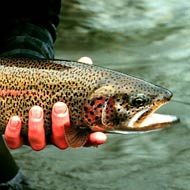
Plymouth scientists hope to reduce testing on live fish
A virtual fish is being developed at Plymouth University with hopes of reducing the need to test on live animals.
Scientists believe the virtual fish could be useful for studying the risks of man-made chemicals in the environment. Leading the project, Professor Awadhesh Jha says traditionally, live animals are used for this.
"For ethical and legal reasons, there has been much emphasis on the use of cells, tissues and organs grown outside the body," he explains.
Plymouth scientists will look at how well the virtual fish compares to testing on a live animal. It is thought just a few live fish could generate enough cells for the amount of testing needed.
The project has been awarded a grant of £600,000 from the Biotechnology and Biological Sciences Research Council, the Natural Environmental Research Council and pharmaceutical company AstraZeneca.
Previously, the university has managed to form a ball of liver cells from rainbow trout. Plymouth researchers say this ball gives a more accurate picture of how an animal's body would respond to a chemical in the environment, than cells grown in a laboratory.
Scientists will now work on developing the technique using cells from the gut and gills of fish. The model was developed by PhD student Matthew Baron, as part of a project led by Prof Jha.
"We have already demonstrated that using fish liver cells maintains basic biochemical functions, can metabolise environmentally relevant contaminants and therefore has the potential to replace whole animal tests," said Prof Jha.
"Since billions of cells from several different organs can be harvested from a single fish, it means that far fewer fish will be used in research, and those that are will not be used directly in experiments."
UK Government figures show nearly 59,000 live fish were used for research testing environmental pollutants in 2011. Strict government rules mean the number of products that will need testing globally could translate into millions of live animals in coming years.
The three-year project began this month and research will be conducted at Plymouth University in collaboration with AstraZeneca.



 The latest
The latest